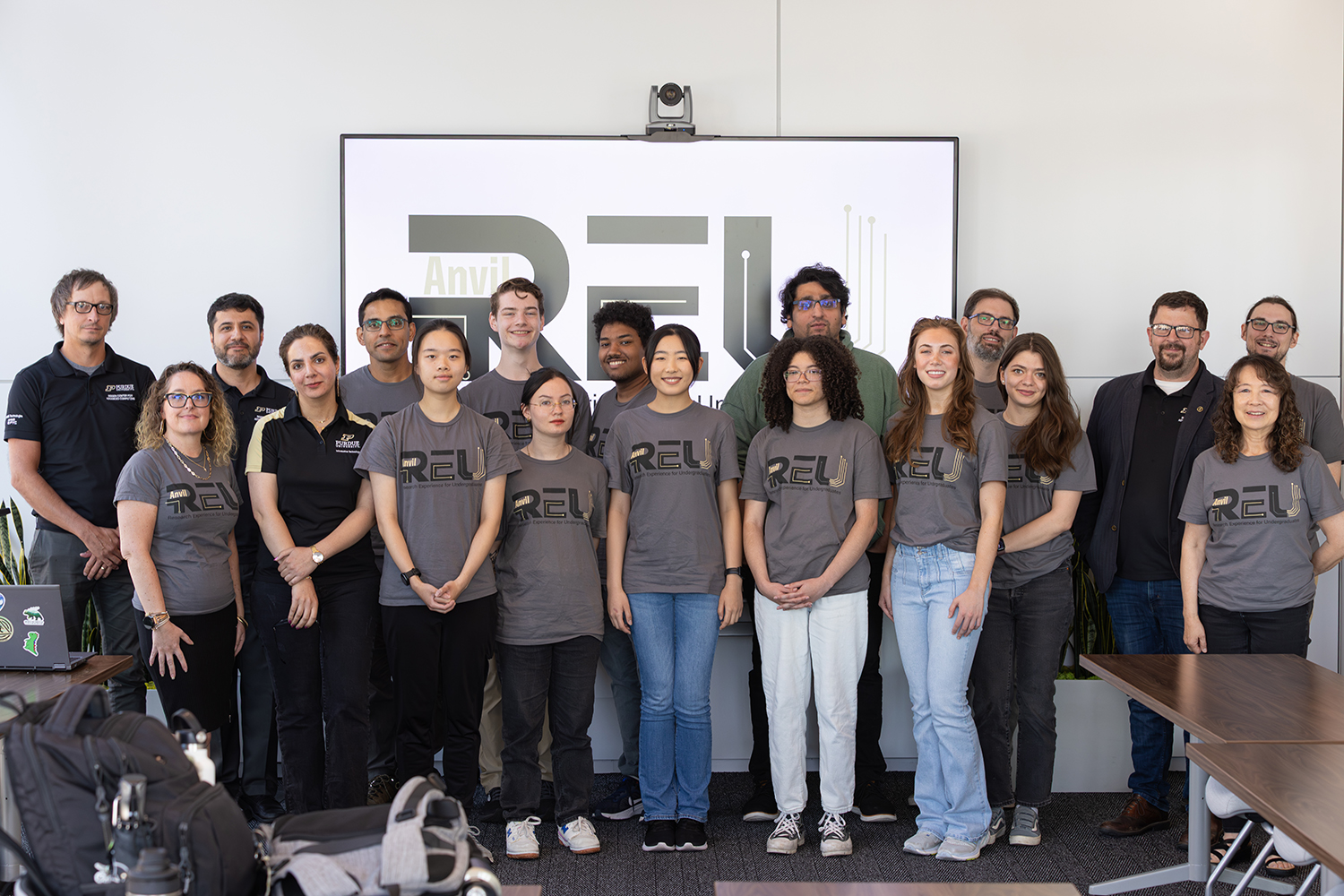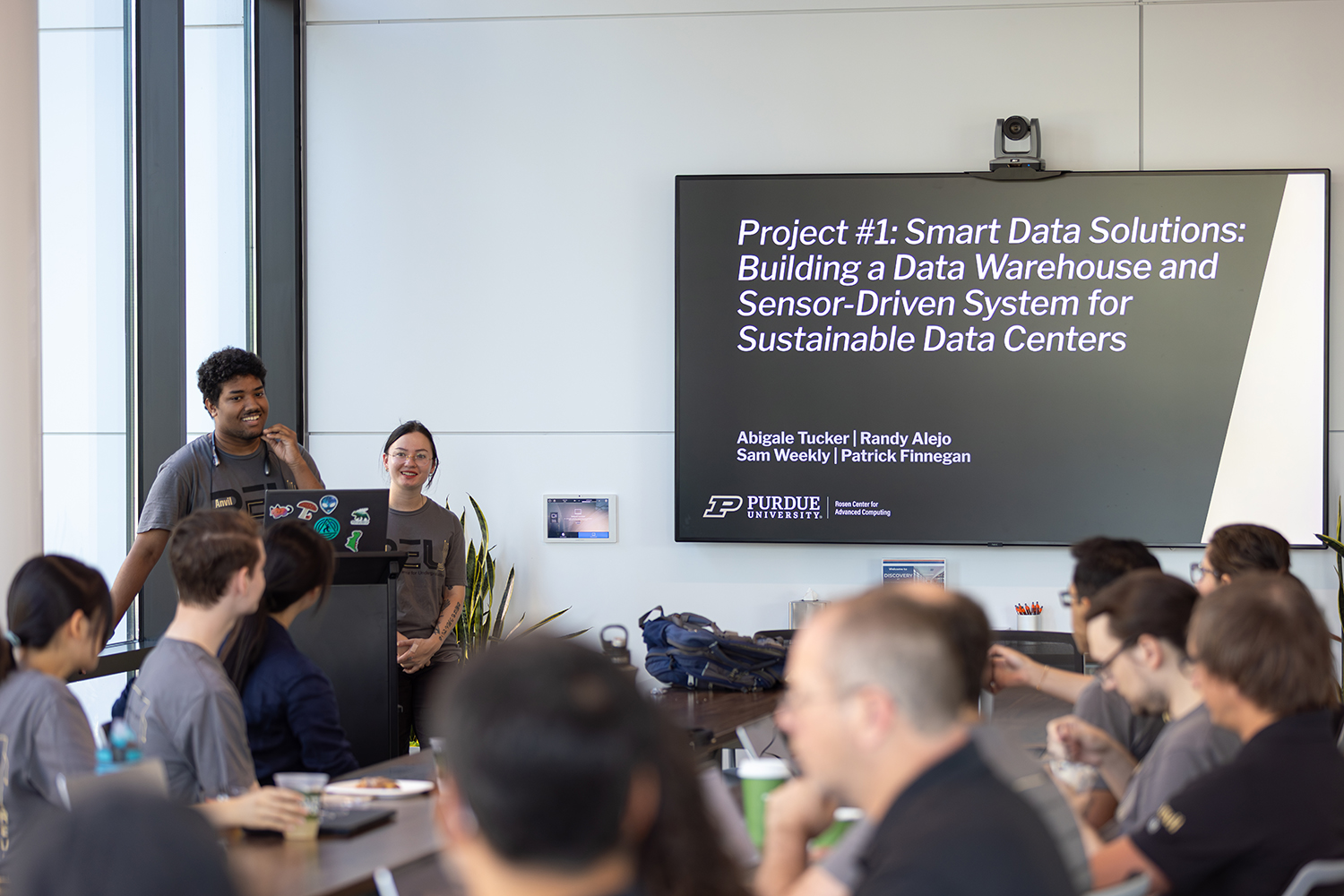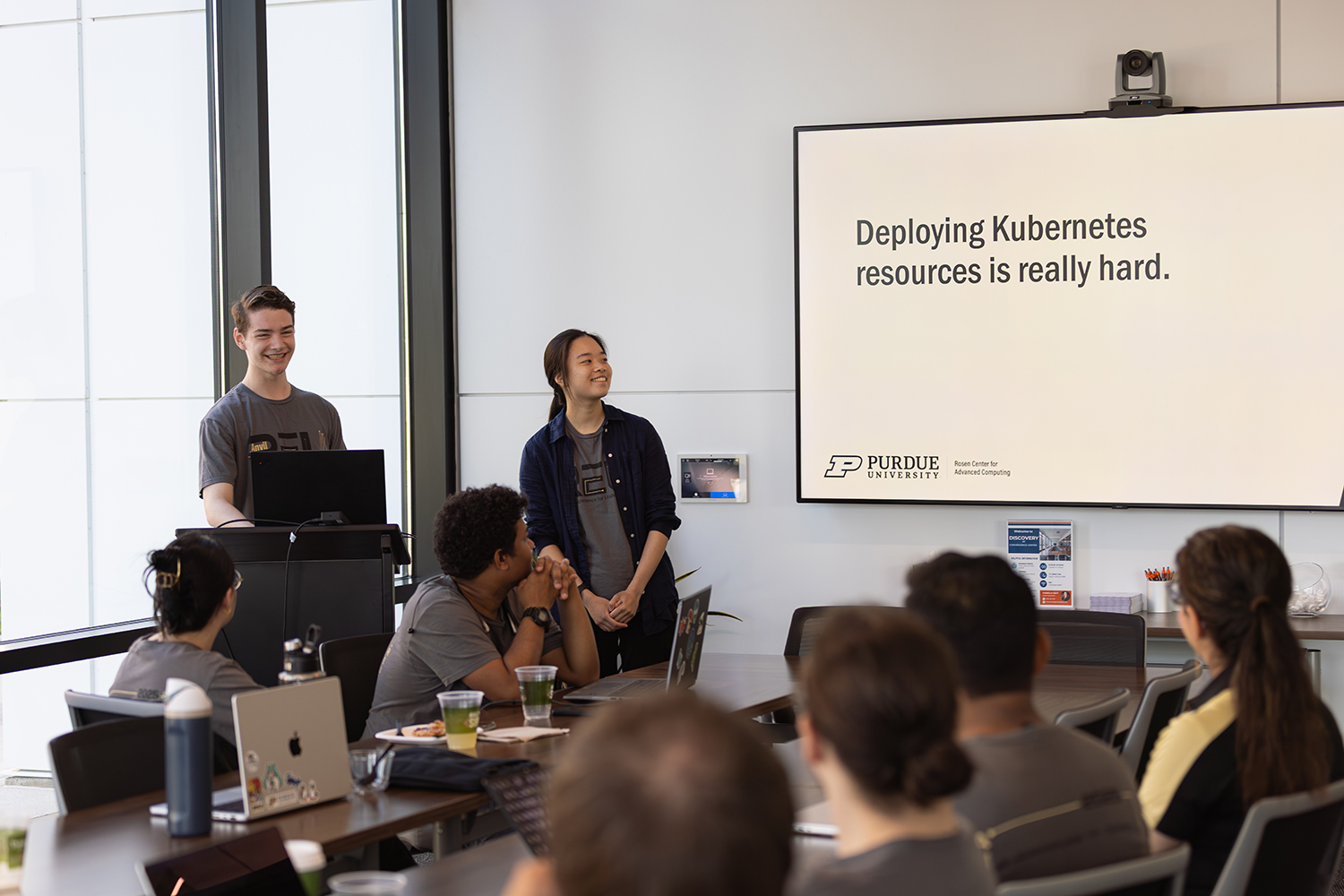RCAC hosts successful Anvil REU Summer 2025 program
Over the summer, the Rosen Center for Advanced Computing (RCAC) hosted its annual 11-week hands-on internship, the Anvil Research Experience for Undergraduates (REU) Summer program.
Eight students from across the nation gathered at Purdue’s campus in West Lafayette, Indiana, for this year’s Anvil REU program. The students enrolled in this internship program to learn about high-performance computing (HPC) and to work on projects related to the operations of the NSF-funded Anvil supercomputer at Purdue. During the program, which is supported by the National Science Foundation (NSF), the students obtained the knowledge and skills necessary to build and support advanced research computing systems and scientific applications on these systems.
The Anvil REU program is a paid summer internship open to undergraduate students in the United States, regardless of their background. Due to a massive influx of applications—over 600 total—the application window closed early in mid-January of this year. This was a significant increase in applicants from 2024. The Anvil REU mentors—eight RCAC staff members who led the projects that the students would work on during the summer—along with the Anvil executive team, took this list of 600+ applicants and distilled it down to eight students. The eight participants of the Anvil REU program were:
- Abigale Tucker, Computer Science major, Middle Tennessee State University
- Randy Alejo, Computer Science major, Stony Brook University
- Brendan Swanson, Computer Science major, North Carolina State University
- Emma Zheng, Computer Science major, Purdue University
- Abigail Lin, Computer Science major, University of Florida
- Sadra Williams, Computer Science major, North Carolina State University
- Christina Joslin, Data Science and Applied Statistics major, Purdue University
- David Burns, Computer Science major, University of Wisconsin–Madison

The Anvil REU program consisted of four separate projects, with two students pairing together to tackle each one. These projects were chosen with real-world applicability in mind—the students would not only gain experience with HPC and learn new skill sets, but would simultaneously increase Anvil’s capabilities. Each project also had two mentors working with the students to help them achieve their goals.
Project 1:
The first Anvil REU project for 2025 focused on building a data warehouse to store and manage logs from data centers and compute systems, integrating data sources, and creating visual dashboards. Two students, Abigale Tucker and Randy Alejo, teamed up to take on this project under the supervision of their mentors, Sam Weekly and Patrick Finnegan, as well as Anvil Executive Team member Preston Smith. In this project, Tucker and Alejo built a data warehouse and several data pipelines that collect, transform, store, and enable the querying of data. The Anvil supercomputer supports over 12,000 users throughout the U.S. These users generate massive volumes of data encompassing a variety of scientific domains. Managing such a large amount of data is a difficult task, especially when it needs to be easily obtained at any point in the research process. Tucker and Alejo tackled this problem by designing a system to efficiently manage, process, and store this data, making it accessible, organized, and ready for analysis when it’s needed most. Their pipeline was developed using a tech stack that included Apache Kafka, ClickHouse, Apache Iceberg, Grafana, and Apache Superset. They tested their system by creating a testing environment that simulated the real architecture but used fake data, allowing them to validate and troubleshoot without risking the security of real researcher data or interrupting system processes that were already in place. Once they were pleased with the functionality and performance of their pipeline, they were able to connect it to real-world data on the Anvil system.

Project 2:
The second Anvil REU project worked on developing a dynamic web interface for building and deploying container workloads on the Anvil Composable Subsystem. Brendan Swanson and Emma Zheng worked on this project under the supervision of their mentors, LJ Lumas and Haniye Kashgarani, and Anvil Executive Team member Erik Gough. The Anvil Composable Subsystem is a Kubernetes-based private cloud that provides a platform for creating composable infrastructure on demand. This cloud-style flexibility provides researchers the ability to self-deploy and manage persistent services to complement HPC workflows and run container-based data analysis tools and applications. The problem is that deploying applications to Kubernetes can be really difficult, especially for beginners. To combat this issue, Swanson and Zheng developed AnvilOps, a user-friendly web interface that automates the deployment of applications to Anvil Composable without writing Kubernetes manifests. Thanks to their hard work throughout the summer, AnvilOps features seamles Git integration, the ability to monitor and deployments roll back to previous versions if needed, and supports a wide variety of languages and frameworks so users can connect their GitHub repository as-is. All of this allows for Anvil users of any experience level to deploy applications at the click of a button.

Project 3:
The third Anvil REU project focused creating easy-to-use bioinformatics workflow templates. Abigail Lin and Sadra Williams worked on this project with their mentors, Nannan Shan and Arun Seetharam, as well as Anvil Executive Team member Arman Pazouki. Genomics research that utilizes HPC resources has been accelerating in the past few years, which has been great for discovery in the field. However, biologists often lack a deeper understanding of computing and computational workflows, which can severely hinder (or altogether halt) their research projects. To aid in this issue, Lin and Williams developed four Bioinformatics Workflow Templates for genomics analyses, each tailored for Purdue’s Anvil HPC platform. The templates were: RNA-seq, variant calling, genome assembly, and general (a customizable option where users can easily create their own workflow). By completing their project, Lin and Williams have provided bioinformatics researchers with little programming knowledge a simple and easy way to conduct their science on Anvil.

Project 4:
For the fourth Anvil REU project, Christina Joslin and David Burns worked with their mentors, Elham Barezi, Ashish, and Anvil Executive Team member Carol Song, to add an automated document generation feature to TicketHub, a proprietary AI-enabled tool for user support staff. The scope of their project was to create a new feature that would proactively generate useful FAQs by using Natural Language Processing (NLP) and Large Language Models (LLMs) to identify and summarize common user issues from past user support requests. Maintaining accurate and up-to-date technical documentation is a time-consuming and heavily manual task for support staff at HPC facilities. By taking on this project, Joslin and Burns worked to remove some of the burden placed on Anvil’s support team. The students successfully developed this new TicketHub feature over the course of the internship, and ws able to test its performance by evaluating the generated FAQs in three key areas—clarity, accuracy, and relevance. The FAQs rated high in clarity, and had room for improvement in accuracy and clarity; however, the new feature proved to be very promising and work is ongoing to improve its performance and even extend its use beyond HPC.

A comprehensive educational experience
While the Anvil REU students worked day in and day out all summer, this program was more than a temporary job—it was a completely immersive learning experience. The REU students had access to their mentors and to the RCAC staff working on-site. On top of that, the students were able to take tours of the campus, attend presentations hosted by both RCAC and the SURF (Summer Undergraduate Research Fellowship) program, participate in technical workshops aimed at developing multiple skillsets (writing research abstracts, effective technical communication, etc.), and even attend the Practice and Experience in Advanced Research Computing (PEARC) 2025 Conference! The eight REU students also gave midpoint presentations on their projects to staff from the Pittsburgh Supercomputing Center (PSC), Lawrence Berkeley National Laboratory (LBNL), National Energy Research Scientific Computing Center (NERS), and Pacific Northwest National Laboratory (PNNL).
Aside from technical workshops and presenation experience, the REU students were able to take part in workshops dedicated to developing more intangible skills. One such workshop was led by Syd Moore, an Academic Advisor & Gallup-Certified Strengths Coach, and guided the group through the myStrengths talent assessment. Another was led by Matt Jones, Certified Master Facilitator in LEGO® SERIOUS PLAY® methods (LSP). This session introduced the students LSP, a facilitated thinking, communication and problem solving technique for use with organisations, teams, and individuals. Both of these workshops took place at the beginning of the summer and had a follow-up midway through to build on the lessons learned and further develop the students to prepare them for their future careers. Giving these students the opportunity to gain as much knowledge and experience as possible is a vital component of the Anvil REU program. In this way, RCAC can help to ensure that each one of the REU participants develops into a capable and competent cyberinfrastructure professional.
The Anvil REU program also scheduled ample amounts of time for socializing, fun, and relaxation. Thanks to the RCAC’s partnership with the SURF program, the REU students were able to attend multiple SURF Socials throughout the summer. This allowed the students to hang out with other undergraduates who were at Purdue for non-HPC-specific research projects, leading to new friendships and expanding their professional networks. Of course, the REU participants also socialized outside of these programmed events, but teaching them—by example—the value of having a positive work-life balance is an essential part of professional development.
Mission accomplished
On the final day of the Anvil REU program, the students presented their work to the Anvil team. As they demonstrated the results of their projects, each student discussed their accomplishments, obstacles, failures, and what they learned throughout the summer. The students were then asked questions and given them feedback on their presentations. To the Anvil team, it was wonderful to hear how this summer might help steer the future careers of these students, many of whom expressed a desire to continue within the field of HPC. Overall, these eight students made fantastic progress: they completed their projects, learned technical and interpersonal skills they will need in the workforce, and gained an in-depth understanding of the HPC world.
To learn more about the upcoming 2026 summer Anvil REU program, please visit our Research Experience for Undergraduates webpage. Applications are now being accepted. The application deadline is February 16, 2026, but may close earlier based on the volume of submissions. Interviews for positions will begin in January of 2026.
For more information regarding HPC and how it can help you, please visit our “Why HPC?” page.
Anvil is one of Purdue University’s most powerful supercomputers, providing researchers from diverse backgrounds with advanced computing capabilities. Built through a $10 million system acquisition grant from the National Science Foundation (NSF), Anvil supports scientific discovery by providing resources through the NSF’s Advanced Cyberinfrastructure Coordination Ecosystem: Services & Support (ACCESS), a program that serves tens of thousands of researchers across the United States. Researchers may request access to Anvil via the ACCESS allocations process. More information about Anvil is available on Purdue’s Anvil website. Anyone with questions should contact anvil@purdue.edu. Anvil is funded under NSF award No. 2005632.
Written by: Jonathan Poole, poole43@purdue.edu
